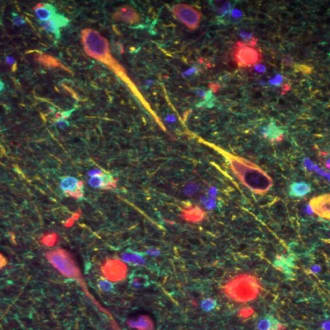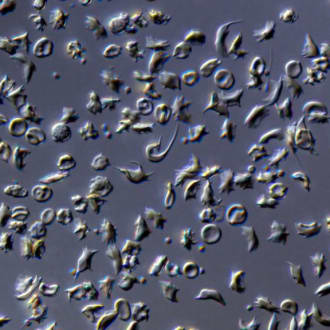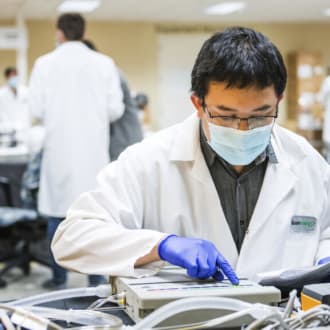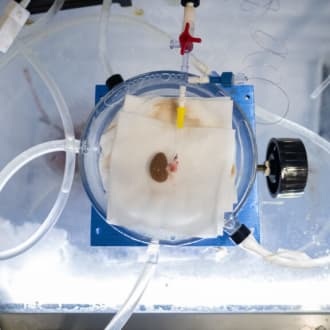The Best of STAT
20+ most popular STAT articles, as voted by our community.
STAT on Biotech
This biotech aims to cure Alzheimer's by killing gum-disease bacteria
Cortexyme is betting that an infectious agent causes Alzheimer’s, and that targeting that pathogen can stop and even reverse the disease.
Answers to some of biotech’s burning questions — and issues to watch
STAT takes a closer look at the most closely followed biotech companies, rounding up answers to some of our earlier questions and posing some new ones.
STAT on Genetics
CRISPR pioneer Doudna opens lab to run Covid-19 tests
The effort is one more sign of the desperation in major metropolitan areas to ramp up testing for the coronavirus, called SARS-CoV-2.
First CRISPR treatment for blood diseases shows early benefits
The encouraging data offer hope that genome editing might one day offer a safe, durable cure for sickle cell disease and beta thalassemia.
STAT on Health Care
Ventilators are overused for Covid-19 patients, doctors say
If the iconoclasts are right, putting coronavirus patients on ventilators could be of little benefit to many and even harmful to some.
Artificial intelligence: crossing the border between health care and tech
The promise of health AI comes with the humility that those who develop health algorithms have learned: algorithms are only as good as the data that go into them and the humans who interpret the…
«During my career, I have spent time on each side. Now, as the CEO of a company on the border, I’ve developed a deeper understanding of the differences that create barriers to mutual innovation. For health AI to achieve its potential, health care and tech companies must keep the big picture top of mind: health care is about saving lives.»
STAT on Medicine
A Google Brain scientist turns to AI to make medicine more personal
Maithra Raghu, a research scientist at Google Brain, is betting that neural networks can become a powerful tool in medicine.
Even with lawsuits and copay caps, will insulin ever be affordable?
The headlines generated by the Inflation Reduction Act's insulin copay cap gave many people the impression that Congress had done its job to control insulin costs. But that is hardly the case.
STAT on Neurology
Jolting the brain's circuits with electricity is moving from radical to almost mainstream therapy. Some crucial hurdles…
Researchers believe that neurology will soon be comfortable incorporating brain stimulation into routine care, just as cardiology has accepted electrical devices such as pacemakers and defibrillators…
STAT on Parkinsons
Doctors treat Parkinson’s with a novel brain cell transplant
In a secret experiment, researchers replaced the dysfunctional brain cells of a Parkinson’s patient with the progeny of an extraordinary type of stem cell.
STAT on Science
Scientists successfully unfroze rat organs and transplanted them — a ‘historic’ step that could someday transform transplant…
In an ‘historic’ first, scientists freeze, thaw, and transplant rat organs — bringing transplant medicine one step closer to sci-fi dreams of stopping biological time.
Q&A: The scientific integrity sleuth taking on the widespread problem of research misconduct
Scientific integrity sleuth Elisabeth Bik, a member of the 2024 #STATUSList, is taking on the widespread problem of research misconduct.
STAT on Techbio
Here’s why we’re not prepared for the next wave of biotech innovation
This is "biology's century," @matthewherper writes. But we’re approaching a moment when changes in what we understand are every bit as terrifying as exhilarating.
Popular
These are some all-time favorites with Refind users.
A third Covid autumn is upon us. Here’s a look at where we stand
Where things stand now with the pandemic, and who is being hurt the most, as the country prepares to enter its third Covid autumn.
FDA authorizes Pfizer and Moderna Covid boosters targeted against Omicron strains
The FDA authorized new Covid booster shots from Moderna and Pfizer that more closely match the strains of the coronavirus that are currently circulating in the U.S.
Covid hasn't given up all its secrets. Here are 6 mysteries experts hope to unravel
More than two years after SARS-CoV-2 appeared, there are still many mysteries about the virus and the pandemic it caused. STAT examined six key mysteries that scientists are beginning to unravel.
The campaign to rename monkeypox gets complicated
Renaming monkeypox — the virus and the disease — is proving more challenging than some expected.
Seven months later, what we know — and don't know — about Covid-19
Here are some of the things we have learned about Covid-19, and some of the pressing questions that we still need answered.
What is Refind?
Every day Refind picks the most relevant links from around the web for you. is one of more than 10k sources we monitor.
How does Refind curate?
It’s a mix of human and algorithmic curation, following a number of steps:
- We monitor 10k+ sources and 1k+ thought leaders on hundreds of topics—publications, blogs, news sites, newsletters, Substack, Medium, Twitter, etc.
- In addition, our users save links from around the web using our Save buttons and our extensions.
- Our algorithm processes 100k+ new links every day and uses external signals to find the most relevant ones, focusing on timeless pieces.
- Our community of active users gets the most relevant links every day, tailored to their interests. They provide feedback via implicit and explicit signals: open, read, listen, share, mark as read, read later, «More/less like this», etc.
- Our algorithm uses these internal signals to refine the selection.
- In addition, we have expert curators who manually curate niche topics.
The result: lists of the best and most useful articles on hundreds of topics.
How does Refind detect «timeless» pieces?
We focus on pieces with long shelf-lives—not news. We determine «timelessness» via a number of metrics, for example, the consumption pattern of links over time.
How many sources does Refind monitor?
We monitor 10k+ content sources on hundreds of topics—publications, blogs, news sites, newsletters, Substack, Medium, Twitter, etc.
Can I submit a link?
Indirectly, by using Refind and saving links from outside (e.g., via our extensions).
How can I report a problem?
When you’re logged-in, you can flag any link via the «More» (...) menu. You can also report problems via email to hello@refind.com
Who uses Refind?
450k+ smart people start their day with Refind. To learn something new. To get inspired. To move forward. Our apps have a 4.9/5 rating.
Is Refind free?
Yes, it’s free!
How can I sign up?
Head over to our homepage and sign up by email or with your Twitter or Google account.



















